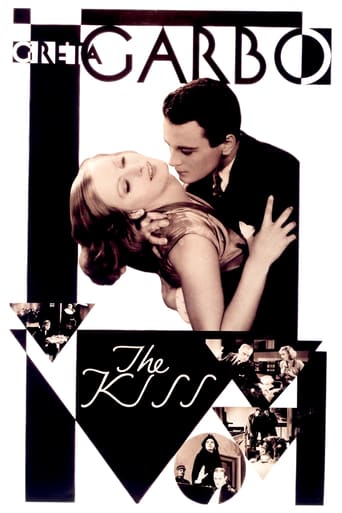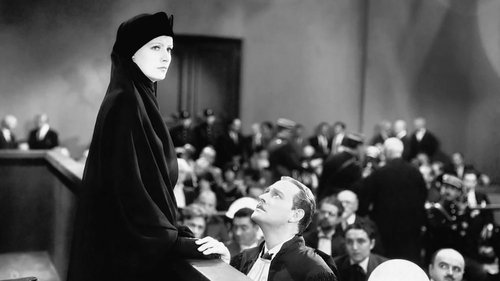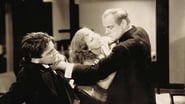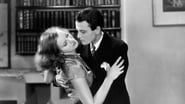Claudio Carvalho
In Lyons, Irene Guarry (Greta Garbo) is not happy with her marriage with the old businessman Charles Guarry (Anders Randolf) and is in love with the young lawyer André Duball (Conrad Nagel). Irene knows that the jealous Charles will never give the divorce to her; therefore they decide to stop seeing each other since she does not want to be an unfaithful wife and defy the convention. André also decides to move to Paris. One day, Irene knows the eighteen year-old college student Pierre Lassalle (Lew Ayres) in a party during his vacation and she learns that the youngster is infatuated with her. By the end of his vacation, Pierre asks a photo for Irene and she promises to give one to him. Meanwhile Charles has a meeting with Pierre's father Lassalle (Holmes Herbert) and discloses that he is on the verge of bankruptcy. Lassalle promises to help his friend and they schedule a meeting in the night. When Charles goes to the encounter, Pierre arrives at his home and asks for a goodbye kiss to Irene. Meanwhile Charles does not feel well and returns home, witnessing their kiss. Charles tries to kill Pierre and later the student arrives home and tells his father that Charles is dead. Irene is arrested accused of murdering her husband. What happened in Charles's office? "The Kiss" is a melodramatic romance and the last MGM and Greta Garbo's silent film and the debut of Lew Ayres. The movie has beautiful shots, a mystery and Greta Garbor extremely beautiful. Despite being a silent film, MGM uses sound technology with a powerful orchestral soundtrack. My vote is seven.Title (Brazil): "O Beijo" ("The Kiss")
MissSimonetta
The Kiss (1929) was the final silent film produced by Metro-Goldwyn-Mayer. It was also the final silent film of stars Greta Garbo and Conrad Nagel.The subtle acting and sophisticated (and purely visual) storytelling show how far silent cinema had come by the late 1920s. When talkies took over Hollywood, the acting regressed back to that of the stage, the background music was replaced with static hiss, and even basic film-making techniques were restrained due to the sound equipment. It would take a few years for sound technology to grow in sophistication.Removed from its distinction as the end of an era, The Kiss is an average melodrama, especially for Garbo, who plays an unhappily married woman in love with another man. She looks luminous and acts completely with her eyes, her brilliance showing through even in material such as this. Conrad Nagel is competent in an unchallenging role, and Lew Ayres is simultaneously adorable and somewhat sinister as the young man smitten with Garbo.The big twist is predictable and the recorded score is cheesy, using Tchaikovsky's Romeo and Juliet theme as the lovers' leitmotif, but overall, this is a skillfully made bit of melodramatic fluff, the last gasp of MGM's silent output.
Marcin Kukuczka
As a fan of Greta Garbo films, I consider each one of them highly entertaining and worth seeking out. The Swedish beauty could captivate the viewer in many of her roles to such extend that she was as popular in movie world as, much later, the Swedish band ABBA was in music world. Yet, when I talk to people who are quite knowledgeable about the early cinema, I usually encounter the opinion that Garbo films let them down. "She was such a dramatic lady," they say "she can still make us cry." Strange as it may occur, to some extend, this pretentious opinion may be found accurate, particularly when we consider the year 1939 and Garbo's first comedy NINOTCHKA made by Ernst Lubitsch. What a change, what a revelation it was! "A true transformation," some said and indeed, NINOTCHKA proved Garbo's talent in comedy (unfortunately forever bound to fail two years later in TWO FACED WOMAN). But few people know that Garbo had wonderfully modern roles in some other films, roles that can still make your day thanks to their charm and convincing portrayals. One of such films is THE KISS with original musical score, the last silent movie of Garbo and MGM directed by Jacques Feyder with whom Garbo worked later on the German version of "Anna Christie" with Salka Viertel. The uniqueness of THE KISS is the fact that it is very different from all other Garbo films.The kiss of 'good bye' that cost Irene Guarry (Greta Garbo) so much (which was metaphorically Garbo's farewell to silents) is the representation of all human struggles and desires. Simple as the short story may seem, when you watch the film carefully, you realize that the director aimed at conveying some important and a very up-to-date message for all of us: "Listen to your heart not the tyrants of conventions and misery of duties..." There is a bit of everything in the story: wit, romance, jealousy, pardoning... Consider, for instance, the sequence at the court where we get the masterwork of human situation, individual situation in the mute world.The film can boast terrific artistic merits with scenes of exceptional charm. Here, a mention must be made of the party at Lasalle, which again proves the glamor of the silent era. But, most things we can appreciate here are there thanks to the Swedish Sphinx... Garbo. The great Greta gives another brilliant performance in the lead but, as it has already been mentioned, her role differs from other of her silent roles in the way that Irene Guarry appears to be a particularly modern character as well as her story appears to be extremely appealing to modern audience. It is not as much her vehicle as the story which captivates certain viewers. That, however, does not mean that we easily forget the great actress whose presence illumines the moments and supplies them with unique power. There are exceptional shots of Garbo's face. Consider, for instance, the moment she looks at herself in the mirror. Perhaps not as great as the ultra famous moment in FLESH AND THE DEVIL but also highly worth attention. What a great beauty she was! So to speak, THE KISS is a very important movie in both Garbo's career and the history of MGM. It occurs to be a great farewell to the silent era, an interesting look at life situation filled with the affection that any kiss deserves... And for Garbo fans somewhere there in the world: a different look at the famous Swede, yet, unique and magnetic as always.
lugonian
THE KISS (Metro-Goldwyn-Mayer, 1929), directed by Jacques Feyder, goes on record as the last silent movie for both the studio and its popular leading lady, Greta Garbo. Released near the close of the year when talkies were the talk, or in other words, the rage of the movie business, MGM took a gamble on continuing on making product of silent movies that's now considered passé, and keeping the Swedish temptress from appearing in a talkie until finally "Garbo Talks" in the highly popular ANNA Christie (1930). What's even more common up to this point was casting Garbo as an unfaithful woman married to a middle-aged man involved with one closer to her own age. For THE KISS, two young men, screen veteran Conrad Nagel, and newcomer Lew Ayres. While MGM might have placed the versatile Lewis Stone as the older husband, having done so with Garbo in WILD ORCHIDS (1929), Anders Randolf became the final choice. He acts his part with further conviction than Stone would have if he played the part. For a ordinary story (by George M. Seville) that could have taken place anywhere from New York to Tahiti, the setting for THE KISS is in Lyons, France. It's uncertain if the leading players are characters of French descent, but if so, maybe it's a good thing that THE KISS is a silent film since it's a hard to imagine the Swedish Garbo speaking with a French accent? As for the screenplay (credited to Hans Kraly), the story opens at the Museum of Fine Arts where Irene Guarry (Greta Garbo) is meeting secretly with Andre Dubail (Conrad Nagel), her lover. Andre wants Irene to divorce her husband, Charles (Anders Randolf), a silk merchant whose business prevents him from giving his wife the full attention she desires. Fearing of his jealous nature if the two men should meet, and unable to come up with a possible solution, Irene and Andre decide to part company. Returning to her usual lifestyle and social functions, Irene attends one given by her husband's business partner, Lassalle (Holmes Herbert), whose 18-year-old son, Pierre (Lew Ayres), has a crush on her. Suspecting Irene to be unfaithful, Charles hires Durant (George Davis), a detective, to trail her. During the investigation, Durant finds Irene constantly in the company of Pierre, in reality to be all very innocent. One night while Charles to assist Lassalle, whose on the verge of bankruptcy, Pierre comes over to visit with Irene, who had promised him a picture of herself to take with him upon his return to school. Discovering they are alone, Pierre forces himself on Irene with a passionate kiss at the very moment Charles returns to catch them together. As the irate husband beats the frightful youth senseless, Irene suddenly grabs her husband's revolver and off camera fires a shot. Because the police find contradictions in her story, Irene is arrested to later face a murder trial with her former lover, Andre, as her attorney.An acceptable melodrama of the soap-opera school made interesting by its lengthy courtroom climax consisting of various points of views told via flashback depicting what occurred the night of the murder. Aside from such notable camera angles and stylish sets, along with added sound effects of the telephone ringing and a gunshot noise, there's also wonder what secret Irene is holding back from her attorney and what the verdict will be, a common practice in many trial stories.While THE KISS is sometimes credited at 89 minutes, circulating prints available either on the old 1990s VHS format or on cable television's Turner Classic Movies have the running time of 62 minutes, which obviously was the one distributed in theaters since there seems to be no indication of severe editing nor sudden fade-outs. Containing a musical track conducted by Dr. William Axt, its only drawback is its repetitious use of Tschiakowski's love theme composition for "Romeo and Juliet." Other than that, this is typical Garbo of the 1920s that should still be of some interest today and the film for which she kisses goodbye to the art of silent movie making.(**)








